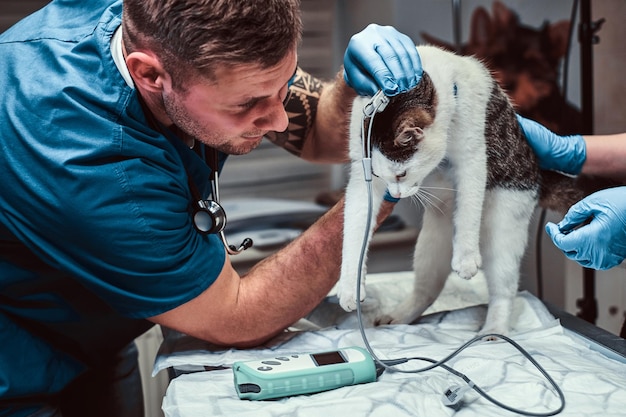Understanding Pet Ultrasound Services at Pet Method McKinney


Understanding Pet Ultrasound Services at Pet Method McKinney
When your pet suddenly seems unwell or you suspect something is not quite right, waiting for answers can be agonizing. Pet owners in McKinney and surrounding communities want fast, accurate information about their pets' health, especially when it comes to internal issues that are not obvious on the outside. At Pet Method Dallas Fort Worth, located at 260 N Coit Rd, Suite 130, McKinney, TX 75071, our veterinary team understands how stressful this uncertainty can be. This is why we offer advanced pet ultrasound services in McKinney, TX, providing a safe and non-invasive way to get a closer look at what is happening inside your cat or dog.
In this blog, we will explore how veterinary ultrasound at our McKinney animal hospital works, the signs that your pet might benefit from imaging, what causes veterinarians to recommend this diagnostic tool, and how the process supports swift, targeted treatment. You will also learn what to expect during your pet’s ultrasound and how this technology fits into the comprehensive care you receive when you schedule an appointment with our expert veterinarians. For those curious about other diagnostic capabilities, you can discover more about our ultrasound diagnostic services for pets at Pet Method McKinney.
Recognizing When Your Pet Might Need an Ultrasound
Many pet owners wonder when a veterinary ultrasound in McKinney, TX might be necessary. The answer often lies in subtle changes or ongoing symptoms that cannot be fully explained by a physical examination alone. Key signs that may prompt your veterinarian to recommend pet ultrasound services include persistent vomiting, unexplained weight loss, changes in appetite, frequent urination, or visible discomfort in the abdomen. Additionally, if your cat or dog develops a sudden limp, shows signs of lethargy that do not resolve, or has bloodwork indicating internal organ concerns, ultrasound imaging can help uncover the root cause.
It is especially important to pay attention when your pet displays symptoms such as swelling in the abdomen, difficulty breathing, or visible pain when touched in certain areas. These issues might signal underlying problems like tumors, organ dysfunction, or fluid build-up that are not evident from the outside. For example, a dog who stops eating and appears bloated could have a gastrointestinal obstruction, while a cat with chronic vomiting and weight loss may be experiencing kidney or liver changes. In these situations, prompt veterinary diagnostics in McKinney, TX are crucial for guiding the next steps in care.
Why Do Pets Need Ultrasound? Understanding the Causes and Benefits
Veterinary ultrasound in McKinney, TX is an invaluable diagnostic tool because it allows our veterinary professionals to see real-time images of your pet’s internal organs and soft tissues. Unlike traditional X-rays, which are best for bones and denser structures, ultrasound excels at revealing details in the liver, kidneys, bladder, heart, spleen, and reproductive organs. Your veterinarian may recommend an ultrasound if bloodwork shows abnormal values, if there is suspicion of tumors or cysts, or to evaluate heart function in pets with cardiac symptoms.
The need for pet ultrasound services often arises when traditional examination and laboratory tests leave unanswered questions. For example, if your dog has elevated liver enzymes but no obvious symptoms, ultrasound can pinpoint inflammation, masses, or gallbladder concerns. Cats with chronic urinary issues benefit from bladder and kidney imaging to check for stones, blockages, or infections. Pregnant pets or those with suspected reproductive conditions may also require ultrasound to assess fetal health or detect pyometra, a life-threatening uterine infection.
The benefits of choosing a veterinary ultrasound in McKinney, TX go beyond just diagnosis. This technology is safe, painless, and does not expose your pet to ionizing radiation. It also supports minimally invasive procedures, such as guiding needle biopsies or fluid collection, ensuring a targeted approach to treatment. If you are interested in a deeper understanding of our diagnostic capabilities, you can explore our pet diagnostic laboratory services for accurate internal assessments, which complement ultrasound findings for a complete picture of your pet’s health.
How Ultrasound Supports Diagnosis and Treatment
When you bring your cat or dog to Pet Method Dallas Fort Worth for pet ultrasound services, our veterinary team will begin by reviewing your pet’s medical history and recent symptoms. During the ultrasound, your pet will typically lie comfortably on a padded table while a gentle, water-based gel is applied to the area being imaged. The veterinarian or trained technician then uses a handheld transducer to send sound waves into your pet’s body, creating detailed images on a monitor in real time.
Depending on your pet’s needs, the ultrasound may focus on the abdomen, heart, or specific organs. The procedure is stress-free and does not require sedation in most cases, although anxious pets or those requiring more detailed imaging may benefit from mild sedation to help them relax. The process usually takes 20 to 40 minutes, and your veterinarian will interpret the results immediately or consult with a specialist if needed.
Treatment approaches following a veterinary ultrasound in McKinney, TX will vary based on the findings. If the ultrasound reveals a tumor, the next steps could involve surgical removal or a biopsy to determine if it is benign or malignant. In cases where inflammation, infection, or organ dysfunction is identified, your veterinarian will discuss targeted medications, dietary changes, or additional diagnostics to guide care. Ultrasound is also instrumental in monitoring chronic conditions, such as heart disease or kidney issues, allowing for adjustments in medication and ongoing management.
Our diagnostic process is often supported by other advanced imaging techniques. If your veterinarian recommends further imaging, you might also benefit from our digital radiology services for detailed pet imaging and diagnosis, which offer a different perspective on your pet’s internal structures.
Steps Pet Owners Can Take at Home and for Prevention
While not all internal health issues can be prevented, there are proactive steps you can take to support your pet’s long-term wellbeing. Regular wellness exams are essential, as they allow your veterinarian to detect subtle changes before symptoms become severe. Preventive care, including routine bloodwork and urinalysis, can highlight early warning signs and prompt timely ultrasound diagnostics in McKinney, TX if needed.
At home, monitor your pet for changes in eating or drinking habits, weight fluctuations, or behavioral shifts. Ensure your pet maintains a healthy diet, receives appropriate exercise, and is protected from toxins or foreign objects that could cause internal injury. For female pets, timely spaying can reduce the risk of reproductive infections and certain cancers, while dental care helps prevent infections that might spread to internal organs.
If your veterinarian recommends follow-up imaging or ongoing monitoring, keeping scheduled appointments and closely following prescribed treatments will help ensure the best possible outcomes. Open communication with your veterinary team will allow you to address concerns promptly and adjust your pet’s care plan as needed.
When to Seek Veterinary Care for Your Pet
Recognizing when to seek professional help is key to protecting your pet’s health. If your cat or dog experiences persistent vomiting, diarrhea, or appetite loss that lasts more than 24 hours, it is time to schedule an appointment. Sudden swelling, breathing difficulties, collapse, or signs of severe pain require immediate veterinary attention. Bleeding, unresponsive behavior, or any symptom that rapidly worsens also signals the need for urgent care.
For ongoing or subtle issues, such as gradual weight loss, increased drinking or urination, or recurring digestive upset, your veterinarian may recommend pet ultrasound services in McKinney, TX to gain clarity and guide treatment. Trust your instincts—if something seems off with your pet, do not wait for symptoms to worsen. Early intervention leads to better outcomes and can prevent minor issues from becoming major health crises.
Our veterinary professionals at Pet Method Dallas Fort Worth are dedicated to comprehensive care, from preventive wellness to advanced diagnostics and treatment. If you are unsure whether your pet’s symptoms warrant an ultrasound or other diagnostic procedures, reach out to our team for guidance. Our mission is to support you every step of the way, ensuring your pet receives compassionate and thorough care.
Compassionate, Comprehensive Pet Ultrasound Care in McKinney
Understanding your pet’s health concerns can be overwhelming, but you do not have to navigate this alone. At Pet Method Dallas Fort Worth, our commitment to advanced veterinary ultrasound in McKinney, TX means your pet receives precise diagnostics and personalized treatment in a caring environment. Whether you are facing a sudden health scare or need ongoing monitoring for a chronic condition, our veterinary team is here to help you make confident, informed decisions.
If you are searching for a "vet near me" that offers state-of-the-art pet ultrasound services and a full range of veterinary diagnostics in McKinney, we invite you to schedule an appointment with our compassionate team. To discuss your pet’s needs or arrange for imaging, call us at (469) 581-8609 or visit our McKinney location. For more information about our imaging capabilities, explore our ultrasound diagnostic services for pets at Pet Method McKinney.
Your pet’s health and happiness are at the heart of everything we do. Let our veterinary professionals be your trusted partners in ensuring a long, healthy life for your furry family members.
Medical Disclaimer: This blog provides general information and should not be used as a substitute for professional veterinary advice, diagnosis, or treatment. Always consult your veterinarian regarding your pet’s specific health concerns. For emergencies or urgent issues, contact your local veterinarian immediately. For more information on the topics discussed, visit reputable sources such as the American Veterinary Medical Association or the American Animal Hospital Association.



















